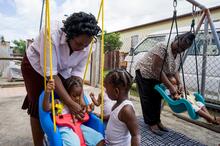About
(Source: ECDAN eNewsletter)
The COVID-19 pandemic has had an unprecedented, disastrous impact on the ability of people to balance work and care for their children and families. Women in Informal Employment: Globalizing and Organizing (WIEGO), UNICEF, and the International Labour Organization (ILO) are advocating for family-friendly policies to protect and ensure social protection and care systems that are good for children, good for women, and good for the economy.
The webinar will share findings detailed in a policy brief that features an increased focus on the well-being and working conditions of caregivers in the informal economy. The brief highlights the need to consider sustainable policy and protection responses instead of quick, short-term measures for more disability inclusive, gender-transformative, and equitable solutions.
On November 18, 2021, we invite ECD implementers and researchers to join in a deep dive on the need for ensuring family-friendly policies and care systems for workers in the informal economy. Through the webinar we aim to better understand government experience in the implementation of inclusive family-friendly policies, and challenges and successes. We will also explore legislative frameworks, policies, government interventions, and role and responsibilities of key stakeholders in creating an enabling environment to implement family-friendly policies.
Speakers
Elizabeth Lule — Elizabeth Lule is a widely recognized expert on international development and global health issues, and has devoted her career to strengthening global commitments and programs addressing the needs of women, adolescents, children and infants. Before joining ECDAN, she served as a senior consultant with the World Bank Group supporting the Global Financing Facility for Every Woman and Every Child and increasing financing for multisectoral pandemic preparedness at both global and national levels. She’s worked previously at the Bill and Melinda Gates Foundation as their Director of Family Planning, at Pathfinder International as their Regional Vice President for Sub-Saharan Africa, and with USAID in Nigeria. She has a joint advanced degree in Medical Demography from the London School of Hygiene and Tropical Medicine and the London School of Economics.
Chemba Raghavan — Dr. Chemba Raghavan currently works as an ECD Specialist in UNICEF HQ in New York. She serves as the deputy for the team, is in charge of Results Management and leads on the work on Parenting and Family-Friendly Policies with a focus on public-private collaborations. Prior to joining UNICEF HQ, Chemba worked in the UNICEF East Asia and Pacific Regional Office (EAPRO) as the Regional Focal Point for the United Nations Girls’ Education Initiative (UNGEI) and as ECD/Education Specialist.
Rachel Moussié — Rachel Moussié is the Deputy Director of the Social Protection Programme at WIEGO. She contributes to WIEGO’s research, analysis and advocacy to extend social protection to informal workers. Since joining WIEGO in 2016, she leads the Child Care Initiative supporting informal workers’ access to quality childcare services as part of social protection systems. Rachel previously led and contributed to programs on women’s economic rights, tax policy reform and development financing at ActionAid International. Rachel holds a MSc in Development Management from the London School of Economics, and a BA from McGill University. She is from and resides in Mauritius.
Susan Thomas — Susan Thomas has been active in the field of Health and Development for the past 37 years. She is currently the National Health Coordinator at Self-Employed Women’s Association, (SEWA). She also manages the Child Care Department at SEWA and has been active in the Childcare campaign led by SEWA in India. As a public health and development professional her focus has been to work on various aspects of issues surrounding women, young people and children with a particular focus on social security.
Boniface Kakhobwe — Boniface Kakhobwe is an Early Childhood Development (ECD) expert with over 19 years work experience with UNICEF, Save the Children and UNDP. He is currently an ECD Specialist in the UNICEF Rwanda country office. Previously, he worked in Malawi, Sierra Leone and Tanzania UNICEF Offices in different capacities.
Fatime-Christine Ndiaye — Fatime- Christiane N’Diaye is the Principal Gender, Equality, Diversity Technical Specialist for French-speaking Africa at the International Labor Organization (ILO). For many years, she was involved in civil society and held the position of Director of the Council of NGOs for Development Support in Senegal (CONGAD). Before joining the Decent Work Support Team of the ILO Dakar Country Office (Senegal), she held various positions in technical networks in Africa, including the coordination of sub-regional projects to fight poverty through the promotion of decent jobs and equality between women and men. In this context, she has supported rural and urban areas on various issues including micro-finance, female entrepreneurship, and integration of gender considerations into development policies and strategies.
Laura Addati — Laura Addati is the Maternity Protection and Work-Family Specialist, Gender, Equality, Diversity and Inclusion Branch, Conditions of Work and Equality Department at ILO Geneva. She coordinates policy work, research and technical assistance to governments, workers and employers on maternity protection and care policies and services. She has co-authored a number of ILO publications, including “Workplace solutions for Childcare” (2010), “Maternity and Paternity at Work” (2014), “Women at Work Trends” (2016); “Care Work and Care Jobs for the Future of Decent Work” (2018) and maternity protection (2016) and childcare for workers in the informal economy (2019 and 2021). Laura has over 15 years of experience within the UN system, including UNDP in Comoros Union and ILO in Central America, Geneva and New York.


